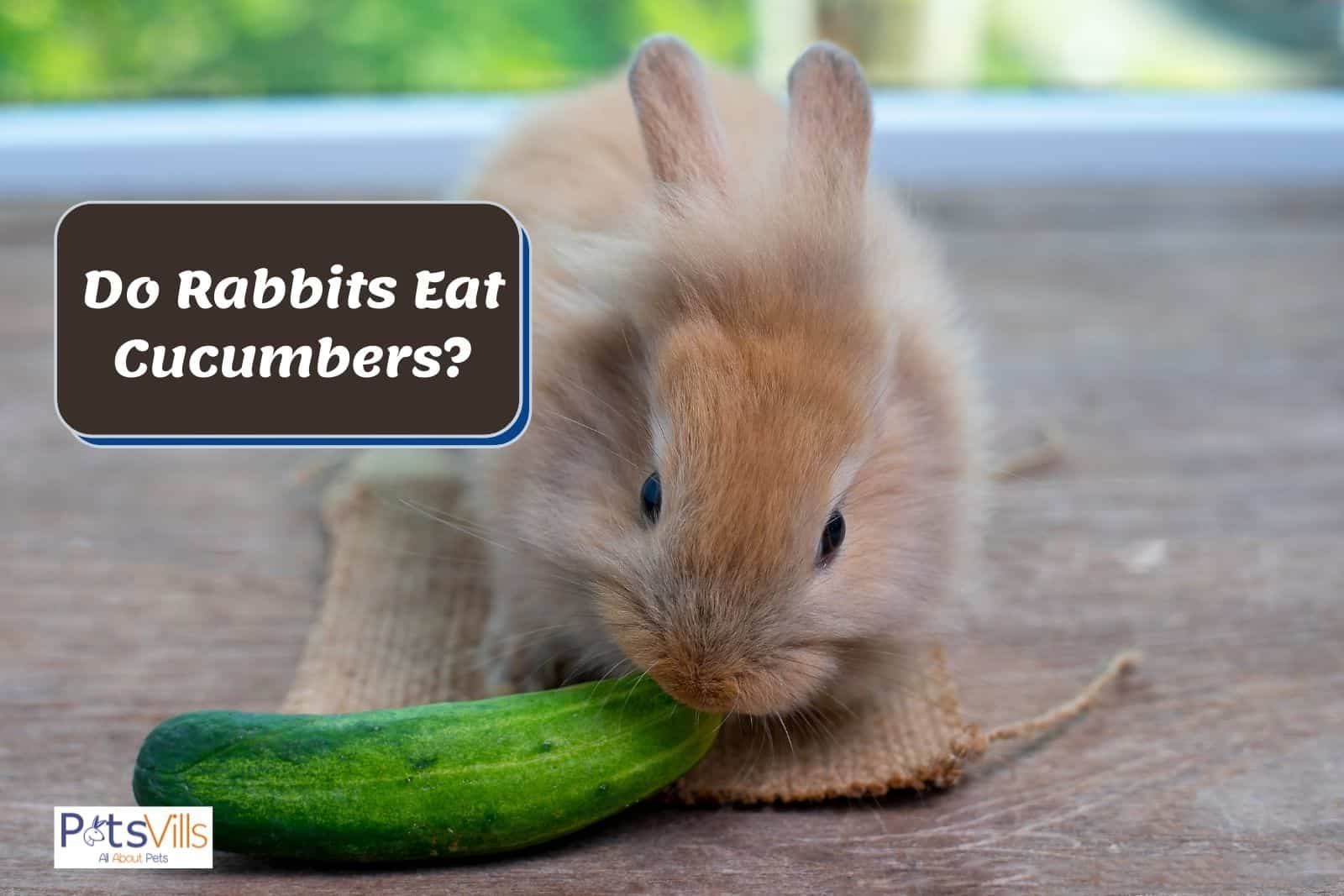Made up of 96% water [1], cucumbers are a refreshing vegetable on hot days, containing very little nutritional value.
Can rabbits eat cucumbers? Yes, rabbits can eat cucumbers, but they should not be fed too often as they contain high amounts of water and can cause diarrhea in excessive amounts.
If you’re not too sure about the benefits and drawbacks of cucumbers for rabbits, then you’re in luck!
Here we’ll be discussing everything you need to know about feeding cucumbers to your rabbit.
Explore the key aspects of feeding cucumbers to your rabbit with this handy summary table, covering portion sizes, preparation, nutritional benefits, and more!
| Attribute | Description |
|---|---|
| How much to eat | Small cucumber slices, 1-2 times per week as a treat |
| Preparation | Wash and slice the cucumber; remove large seeds if necessary |
| Nutritional Benefits | High water content, source of vitamins and minerals |
| Precautions | Gradually introduce to avoid digestive issues, do not replace essential hay and vegetable intake. |
| Storage | Keep fresh cucumbers refrigerated; remove uneaten pieces after a few hours |
Want to get a Holland Rabbit? Learn about lop bunnies.
Table of Contents
Can Rabbits Eat Cucumbers?
Cucumbers are perfectly safe for rabbits to eat [2] and contain a lot of water, making them a perfect refreshing snack for a hot day.
They don’t have a lot of nutritional value but do contain some beneficial nutrients for your rabbit.
Cucumbers are suitable for your rabbit’s skin due to their high water content, and they also contain silica which keeps your rabbit’s connective tissues (like their tendons) healthy and strong.
See the video here to watch the rabbit enjoying eating cucumber
It is important to note that rabbits younger than 12 weeks should not be fed fruits and vegetables, including cucumbers.
This is because young rabbits have very sensitive stomachs that are easily upset by fresh foods.
However, once rabbits are older than 12 weeks old, it is safe to introduce cucumbers, fruits, and other vegetables slowly.
As cucumbers contain a considerable amount of water, it is good not to overfeed this leafy green vegetable. Watery vegetables and fruits can give your rabbit an upset stomach and cause diarrhea.
Cucumber should not be fed daily to your rabbit for this reason. A couple of slices a few times a week is more than enough cucumber for your rabbit to enjoy.
RSPCA.org.uk has put together this brilliant diet planner for rabbits [3] that can help you give your rabbit the correct amount of food.
Related: Can Bunnies Eat Chinchilla Food?
Preparing Cucumbers For Your Rabbit
Before feeding cucumber to your rabbit, you should make sure you wash it thoroughly under water without soap. You should also opt for organic cucumbers if you can.
Chop the cucumber into small pieces. You can leave the skin on, and you don’t need to remove the seeds as both are perfectly safe for your rabbit to eat.
Make sure you don’t feed too much cucumber to your rabbit. A couple of slices is good portion size.
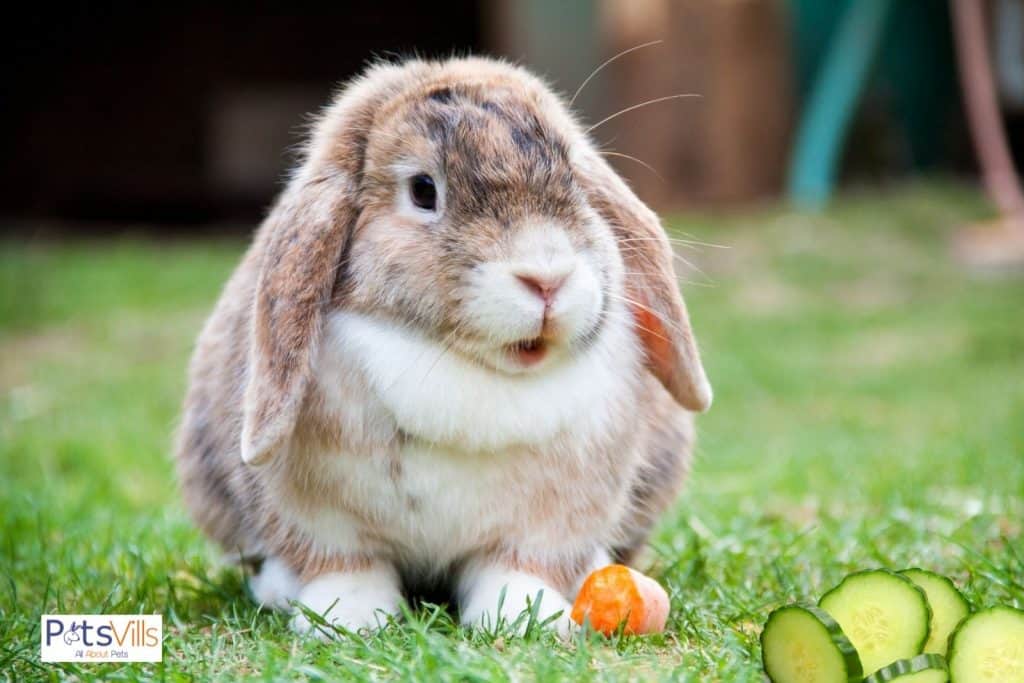
Feeding cucumber too often or in excessive amounts can give your rabbit an upset stomach and runny stools.
When feeding cucumber to your rabbit for the first time, only feed them a small amount and keep an eye on them for 24 hours.
If you grow your cucumbers, make sure you don’t use any fertilizers, pesticides, or chemicals that could be harmful to your rabbit.
Additionally, you can leave the flowers and leaves on cucumbers! Both are safe for your rabbit and can be included in your rabbit’s daily diet.
Cucumbers are a Treat: Feed-in Moderation
Leafy green vegetables are a vital part of your rabbit’s diet. Rabbits need about two cups of leafy green vegetables each day.
As cucumber is a leafy green vegetable, you’d be forgiven for thinking that it can be fed to your rabbit each day.
However, cucumbers should not be fed daily. This is because of its extremely high water content.
Due to how watery they are, cucumbers can cause loose stools (diarrhea) in rabbits and digestive discomfort.
When rabbits have diarrhea, it causes soft cecotropes. Cecotropes are full of nutrients and are found in your rabbit’s stools.
Cecotropes play an essential role in your rabbit’s diet as they contain vitamin B, which your pet cannot make by themselves.
If you’ve ever caught your rabbit eating its stools, then this is why!
When rabbits have diarrhea, the cecotropes are also soft, making them harder to digest. As cecotropes are vital to keeping your rabbit healthy, being unable to ingest them is not a good thing!
That’s why you mustn’t overfeed cucumber to your rabbit! Cucumbers should be viewed as treats and should only be fed to your rabbit a few times a week.
Benefits of Cucumbers: Are They Good For Rabbits?
Cucumber does not have much nutritional value, so it isn’t the best vegetable to feed your rabbit, but it doesn’t mean it is bad for them.
Cucumber does contain a lot of water, which makes it beneficial to feed on hot days to keep your rabbit hydrated.
The skin/peel of a cucumber does contain quite a bit of fiber, which is also great for rabbits.
Additionally, cucumber leaves and flowers are better for your rabbit than the vegetable itself as they contain more nutrients.
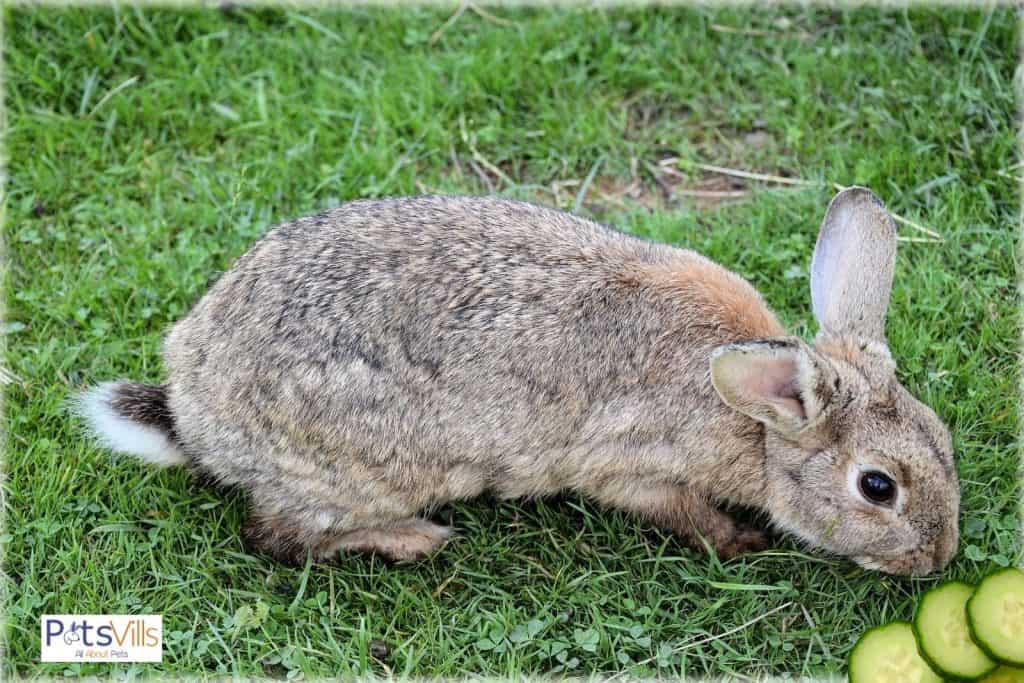
Cucumber is only harmful or bad for rabbits when fed too often or excessively.
This is because cucumber contains a lot of water, which can cause diarrhea in rabbits.
As mentioned earlier, diarrhea causes rabbits to pass loose cecotropes. Soft cecotropes are difficult for rabbits to digest, so they can be dangerous when they regularly get diarrhea.
Cucumber is also low in calories. If your rabbit consumes too much cucumber to the extent of not eating their other food, this can cause weight loss.
Lastly, as cucumber does not contain many nutrients, it should not be the main part of your rabbit’s diet.
Rabbits require a good range of vitamins and minerals to keep them healthy, so there are much better vegetables you can feed your pet regularly.
With these factors in mind, make sure you only feed cucumber now and again. A couple of slices once or twice a week is adequate.
On the other hand, cucumber leaves and flowers can be fed regularly to your rabbit.
Can Rabbits Eat Cucumber Peels?
Cucumber skin (peels) is safe for your rabbit to eat.
Cucumber skin contains a lot of fiber that is great for your rabbit’s health.
However, cucumber skin is relatively complex and rough, so some rabbits might not enjoy its texture and only eat the interior of the vegetable.
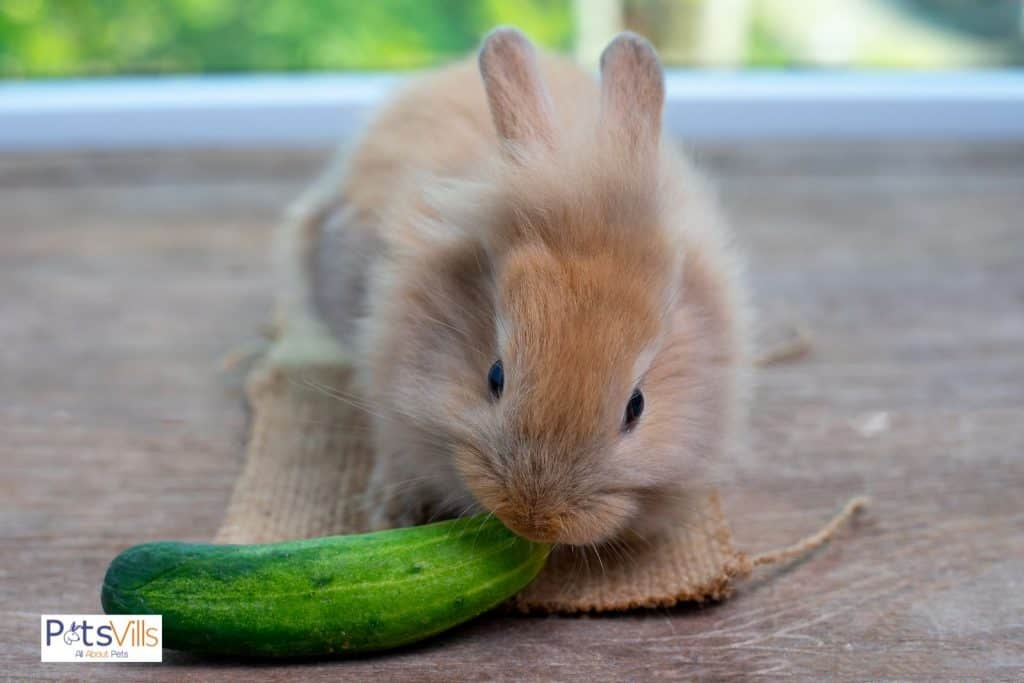
Additionally, cucumber skin can taste bitter, which some rabbits might not be fond of.
Although cucumbers are safe for rabbits, some other vegetables and fruits can be dangerous for rabbits to eat. Peta.org has written an excellent article on 15 foods your rabbit shouldn’t eat.
Can Rabbits Eat Cucumber Leaves and Blossoms?
Yes, cucumber leaves and blossoms (flowers) are acceptable for your rabbit to eat. The leaves and flowers on a cucumber are better for your rabbit than the vegetable itself!
Cucumber leaves and flowers are low in oxalic acid and don’t contain as much water as vegetables. They are also higher in nutrients and vitamins.
You can feed your rabbit cucumber leaves and flowers every day.
Ensure you wash the leaves and flowers thoroughly before feeding them to your rabbit.
Can Rabbits Eat Cucumber Seeds?
You should remove the seeds from most fruits and vegetables before feeding them to your rabbit, but cucumber seeds are one of the few seeds you can leave in.
Cucumber seeds are acceptable for your rabbit to eat. Seeds make a big part of a cucumber, so removing them would mean there would be very little left for your rabbit to eat!
Cucumber seeds are squishy, soft, and small, so they will not get stuck in your rabbit’s teeth or digestive system if consumed.
Unlike apples or seeds, cucumbers are not toxic and will not lead to health issues if your pet munches on them.
What Rabbits Eat
Leafy green vegetables should be given daily to your rabbit, alongside high-quality grass hay, rabbit pellets, and fresh drinking water.
Grass hay-like Timothy hay or meadow hay should be the main bulk of your rabbit’s diet.
Make sure your rabbit always has access to hay to nibble on.
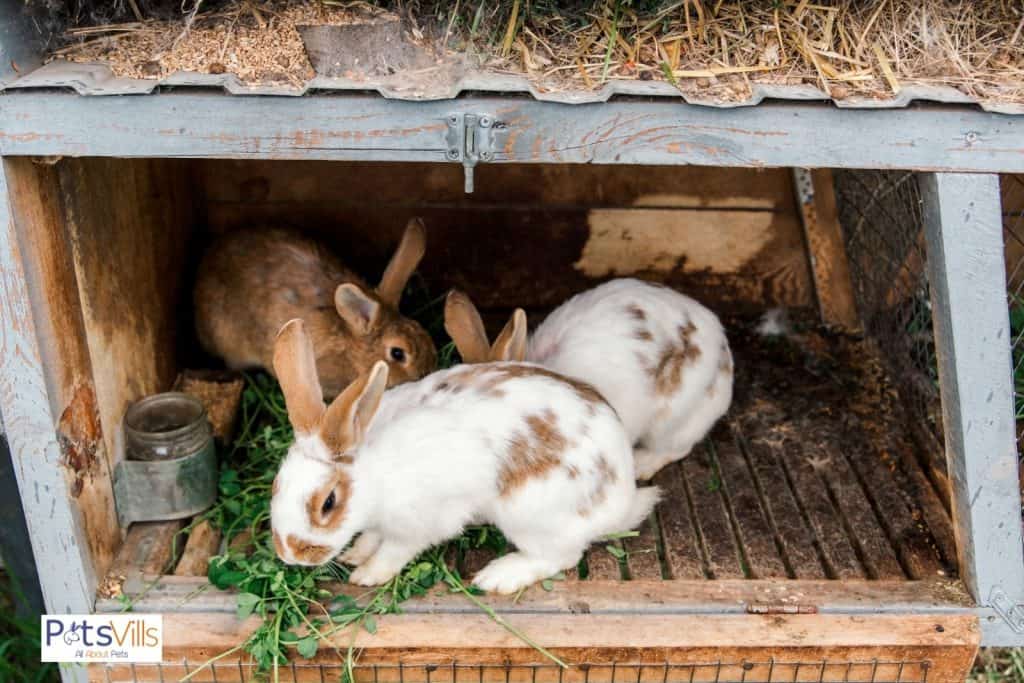
Hay contains dietary fiber that rabbits need to digest food. If rabbits don’t eat enough grass hay, their digestive system won’t function normally.
This can lead to an array of health problems, including GI stasis.
You should feed your rabbit around two cups of vegetables each day, with at least three of these vegetables being leafy greens (more is better!).
Make sure you offer a good variety of leafy greens and rotate them regularly.
Leafy green vegetables contain dietary fiber essential for your rabbit’s digestive system. They also contain essential vitamins and minerals that are good for your rabbit’s overall health.
Offering different types of leafy greens gives your rabbit an array of vital nutrients for their health. In other words, don’t just feed a kind of leafy green vegetable!
Although cucumbers are a leafy green vegetable, they should not be given to your rabbit each day. Good examples of leafy green veggies to feed your rabbit daily include kale, zucchini (courgette), and parsley.
You can feed other vegetables alongside leafy green ones, but certain vegetables should not be fed regularly. For example, root vegetables (like carrots and turnips) should not be provided daily as they are very high in sugar.
You should also make sure you don’t feed vegetables high in oxalic acid too often to your rabbits. A high amount of oxalates in your rabbit’s diet can cause kidney problems over time.
Examples of vegetables that contain a lot of oxalates include spinach and sprouts. Make sure you limit foods high in oxalic acid to once daily.
This means that if your rabbit has already eaten spinach as one of the veggies for their daily vegetable intake, don’t feed them another vegetable (or herb) that is high in oxalates.
Choose a different vegetable, such as celery. Read our complete guide on “Can Rabbits Have Celery?”
Rabbit Pellets And Water
As well as grass hay and leafy green vegetables, it’s a good idea to give your rabbit a small portion of rabbit pellets each day.
These provide some extra fiber and nutrients for your rabbit.
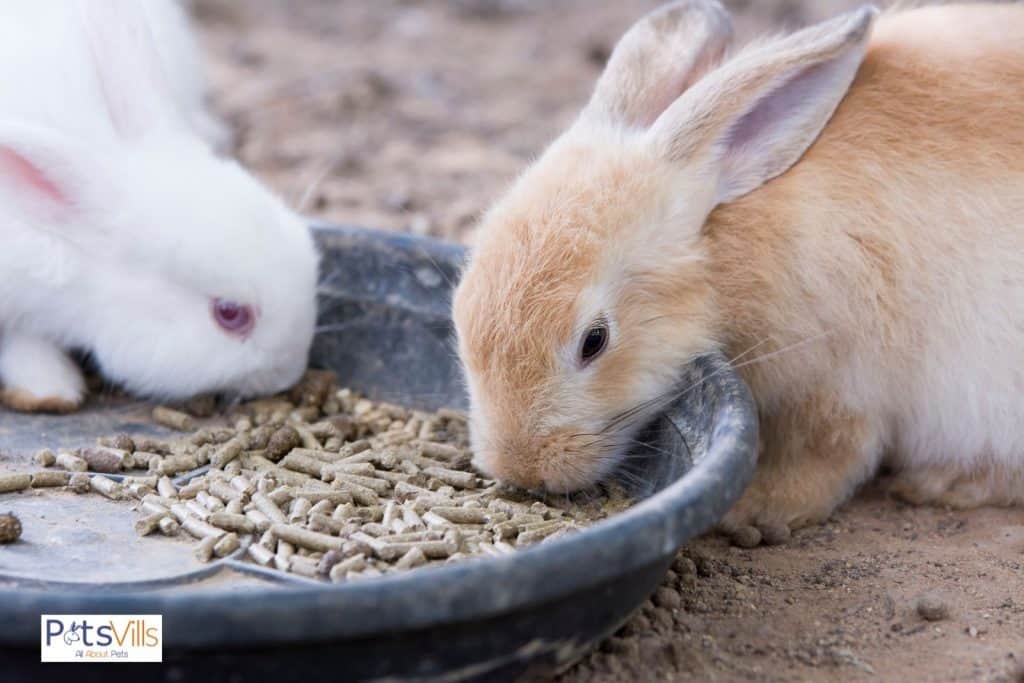
Ensure your rabbit always has access to clean water to drink. Either a water bottle or water bowl will work.
If you are using a bowl, make sure it is heavy and sturdy enough not to be toppled over easily.
If you are using a water bottle, check it regularly to ensure it is working correctly.
You should change your rabbit’s water each day to prevent it from getting dirty or stale.
Only use tap, bottled, or filtered water for rabbits. Don’t collect water from ponds, puddles, streams, rivers, etc., as they can contain pollutants that can be detrimental to your rabbit’s health.
What Other Vegetables Can Rabbits Eat? Alternatives
Here is a list of safe vegetables and herbs for rabbits. All vegetables and herbs should be fed raw as rabbits cannot process cooked foods very well.
- Carrots (and carrot tops)
- Broccoli
- Asparagus
- Brussel Sprouts
- Celery
- Cauliflower leaves and stalks
- Zucchini (courgette)
- Kale
- Chicory
- Parsley
- Dill
- Parsnip
- Radish
- Coriander
- Basil
- Arugula (rocket)
- Radish
- Bell peppers (red, green, orange, and yellow)
- Romaine/dark-colored lettuce (avoid light-colored ones and Iceberg)
- Turnips
- Watercress
- Alfalfa sprouts
- Beet greens
- Beetroot
- Bok/Pak choy
- Cucumber
- Celeriac
- Eggplant/aubergines (avoid leaves as they are toxic)
- Collard greens
- Green beans
- Pumpkin
- Swiss chard
- Butternut squash
Please read our complete guide on what fruits can rabbits eat!
Unsafe Vegetables/Foods For Rabbits
Here are some vegetables or foods that you should not feed your rabbit.
- Potato (including sweet potato)
- Rhubarb
- Cabbage (controversial – can cause gas and diarrhea, especially in sensitive rabbits)
- Bamboo shoots
- Onions
- Leeks
- Chives
- Garlic
- Dried peas
- Sweet peas
- Iceberg lettuce (light-colored lettuces should also be avoided)
- Whole corn kernels
- Beans (like kidney beans, lima beans, soybeans, broad beans)
- Nuts
- Seeds
- Grains
- Cereals
- Oats
- Millet
- Tea leaves
If you’re looking for more food alternatives, mybunny.org has a good list of fruit and vegetables your rabbit can safely consume.
FAQS:
How often do rabbits need leafy green vegetables?
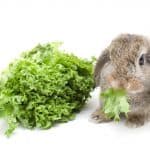
Rabbits require an excellent variety of leafy green vegetables each day. Around two cups of different leafy green vegetables is a good amount.
Can rabbits eat fruit?
Yes, rabbits can eat most types of fruit. Fruits are high in sugar, so they should not be fed more than once or twice a week.
How much hay do rabbits need?
Rabbits need constant access to high-quality grass hay like Timothy Hay. Hay contains fiber that rabbits need to keep their digestive system working efficiently, so it is a vital component of their diets!
Conclusion
In conclusion, rabbits can absolutely enjoy cucumbers as a tasty and hydrating snack! As a pet enthusiast, I love finding healthy treats for our furry friends, and cucumbers are a wonderful option to add variety to a rabbit’s diet.
However, moderation is key. Keep in mind that rabbits should primarily eat hay, supplemented by fresh vegetables and a small number of pellets. Cucumbers can be introduced gradually to ensure your rabbit’s digestive system can handle it.
Make sure to wash and slice the cucumbers before serving, and remember to remove the seeds if they’re too big. This helps prevent any potential choking hazards and keeps your rabbit safe while snacking.
So, next time you’re preparing a salad or enjoying a cucumber yourself, why not share a small piece with your fluffy companion? They’ll appreciate the treat, and you’ll feel great knowing you’re offering them something healthy and hydrating. Are you ready to treat your rabbit to a cucumber snack?
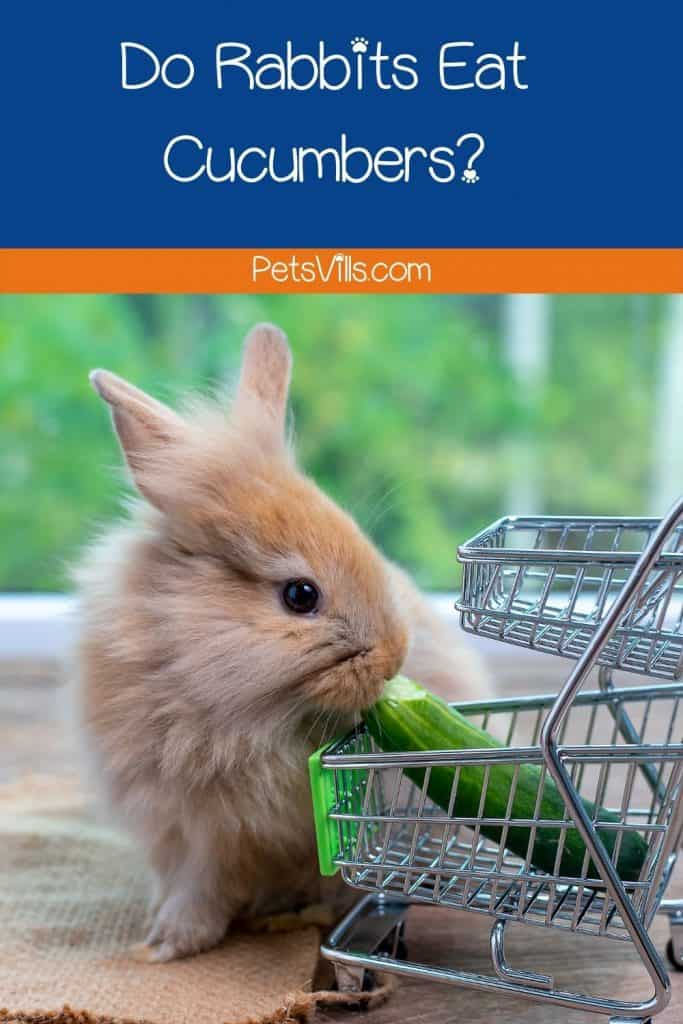
Which food do rabbits like most? What do you think? Please share your opinion below.
Resources
1. Health Benefits of Cucumber [Internet]. WebMD. [cited 2022 Feb 11]. Available from: https://www.webmd.com/diet/health-benefits-cucumber#:~:text=Cucumbers%20are%20more%20than%2096
2. What Do You Feed a Rabbit? [Internet]. www.petmd.com. [cited 2022 Feb 11]. Available from: https://www.petmd.com/rabbit/nutrition/evr_rb_what-do-you-feed-a-rabbit
3. Rabbit diet – Rabbit meal planner – Tips, advice, health [Internet]. Rspca.org.uk. 2017. Available from: https://www.rspca.org.uk/adviceandwelfare/pets/rabbits/diet/planner
Alina Hartley is a small-town girl with a ginormous love of bearded dragons. It all started with Winchester, a baby bearded who was abandoned at the shelter by his former owners because of a birth defect that caused one front leg to be shorter than the other. Alina originally went to the shelter looking for a guinea pig, but one look at Winchester and it was love at first sight. From that day on, Alina has dedicated her life to learning everything she can about bearded dragons. She loves helping new beardie parents start their incredible journey with these magnificent reptiles.
Follow her on:
LINKEDIN
TWITTER.
Read her latest articles HERE
Learn more about her HERE.

